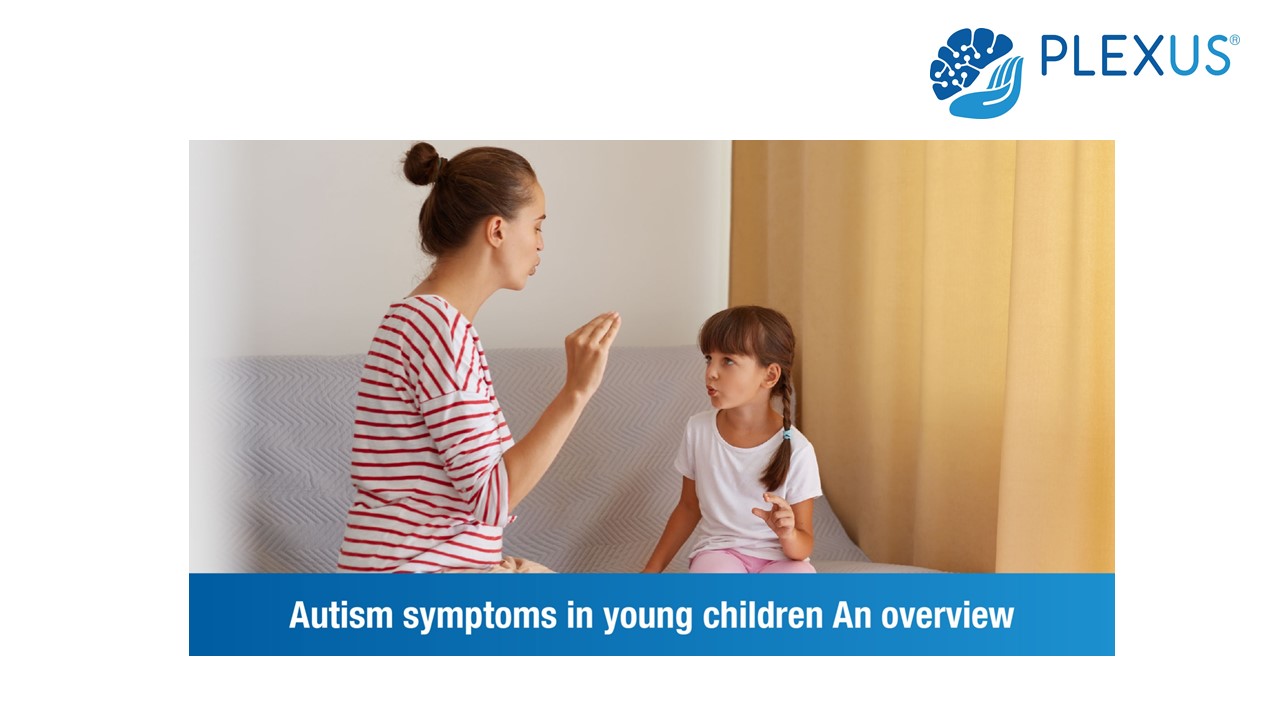Autism Symptoms in Young Children An Overview - PowerPoint PPT Presentation
Title:
Autism Symptoms in Young Children An Overview
Description:
Autism is a complex neurobehavioral condition that causes impairment in social interaction, and language and communication skills. It typically manifests in children between the ages of 2 and 4 years. There have been cases where the first signs were seen in children as young as 6 to 18 months. – PowerPoint PPT presentation
Number of Views:8
Title: Autism Symptoms in Young Children An Overview
1
(No Transcript)
2
What is Autism?
- Autism is a complex neurobehavioral condition
that causes impairment in - social interaction, and language and
communication skills. - It typically manifests in children between the
ages of 2 and 4 years. - There have been cases where the first signs were
seen in children as - young as 6 to 18 months.
3
What happens when a child has Autism?
- Autism impacts the social skills, communication
skills, and behaviour of the child. - It delays the achievement of milestones, with
many children requiring intervention - for communication, motor skills, cognitive
skills and even behaviour management.
4
Earliest symptoms of Autism in infants and young
toddlers
- ? Delayed/not meeting developmental
milestones - ? Little to no eye contact
- ? Not responding to their name
- ? Engaging in repetitive movements like
rocking, arm flapping, etc. - ? Lining up toys and focusing on parts of the
toy rather than the whole - ? Blank/expressionless
- The above are considered red flags and require
immediate attention, - screening, and early intervention therapy.
5
Age-wise milestones that a child must attain
- At 6 months Sitting up (with support), crawling,
laughing and gurgling - Some children can crawl as late 8-9 months (and
this is normal) - At 9 months Sitting up without support, standing
up without support, responding - with soundsand facial expressions, cruising along
furniture (attempting to walk). - The milestone of standing up without support can
be achieved even as late - as 10-11 months
- At 12 months Babbling, responding to name
making gestures like waving, - pointing, and reaching for an object/person
walking few steps
6
- At 16 months Speech skills (using words,
speaking 2-3 syllable words, improved - balance and coordination in movements
- At 24 months Advanced speech skills
(constructing short sentences/phrases), - climbing 4-5 steps without support
- RED FLAG Some children may suddenly regress or
lose communication skills between 12-24 - months after developing them. This is a big red
flag and must be addressed immediately. - Excessive screen time has also been known to
cause speech delay.
7
Behavioral challenges for children with autism
- ? Sensory processing difficulties
- ? Obsessed by a particular part of object
- ? Obsessive interests
- ? Getting upset with minor changes to
routine - ? Playing with toys the same way every time
- ? Lines up toys or other objects and gets
upset when order is changed - ? Displaying emotions in an exaggerated
manner - ? Lack of fear or more fear than expected
- ? Unaware of hazards and dangers
- ? Hyperactive, impulsive, and/or inattentive
behavior
8
Behavioral challenges for children with autism
- ? No shared interests with peers by 15
months of age - ? No facial expressions like happy, sad,
angry, and surprised by 9 months of age - ? Using few or no gestures by 12 months of
age (for example, not waving goodbye) - ? Avoiding or not maintaining eye contact
- ? Not responding to name by 9 months of age
- ? Not interested in pretend play, even by 4
years of age - ? Not pointing to show something interesting
by 18 months of age - ? Not noticing when others are hurt or upset
by 24 months of age - ? Preferring solitary and repetitive play
- ? Not able to grasp the concept of
turn-taking - ? Not initiating interaction with peers
9
Other symptoms parents and caregivers need to
watch out for
- ? Unusual mood or emotional reactions
- ? Anxiety, stress, or excessive worry
- ? Delayed language and movement skills
- ? Delayed cognitive or learning skills
- ? Gastrointestinal issues (for example,
constipation) - ? Unusual eating and sleeping habits
10
Early intervention and its benefits
- Early intervention (EI) enables children with
autism to develop skills that - will significantly elevate their quality of life.
- It is a play-based therapy involving a
combination of - - Intervention
- - Therapy
- - Practice
- EI can greatly benefit children younger than the
age of 7 years, as their short - attention spans may not be conducive to
learning-based interventions.
11
Autism treatment at Plexus
- Plexus offers the best autism treatment plans for
your child. - Our holistic, and timely treatment plans include
- ? Sensory integration therapy
- ? Behaviour retraining therapy
- ? Cognitive behaviour therapy
- ? Social skills training
- ? Improved awareness
- ? Speech therapy
- ? Reduction in hyperactivity habits
- At Plexus, With a combination of therapies and
treatments under the guidance - of Indias foremost neurologist and Autism
specialist, Dr Naeem Sadiq we offer - treatment that suits your childs needs and
lifestyle.
12
Its a wonderful life. Even for a child with
Autism.































